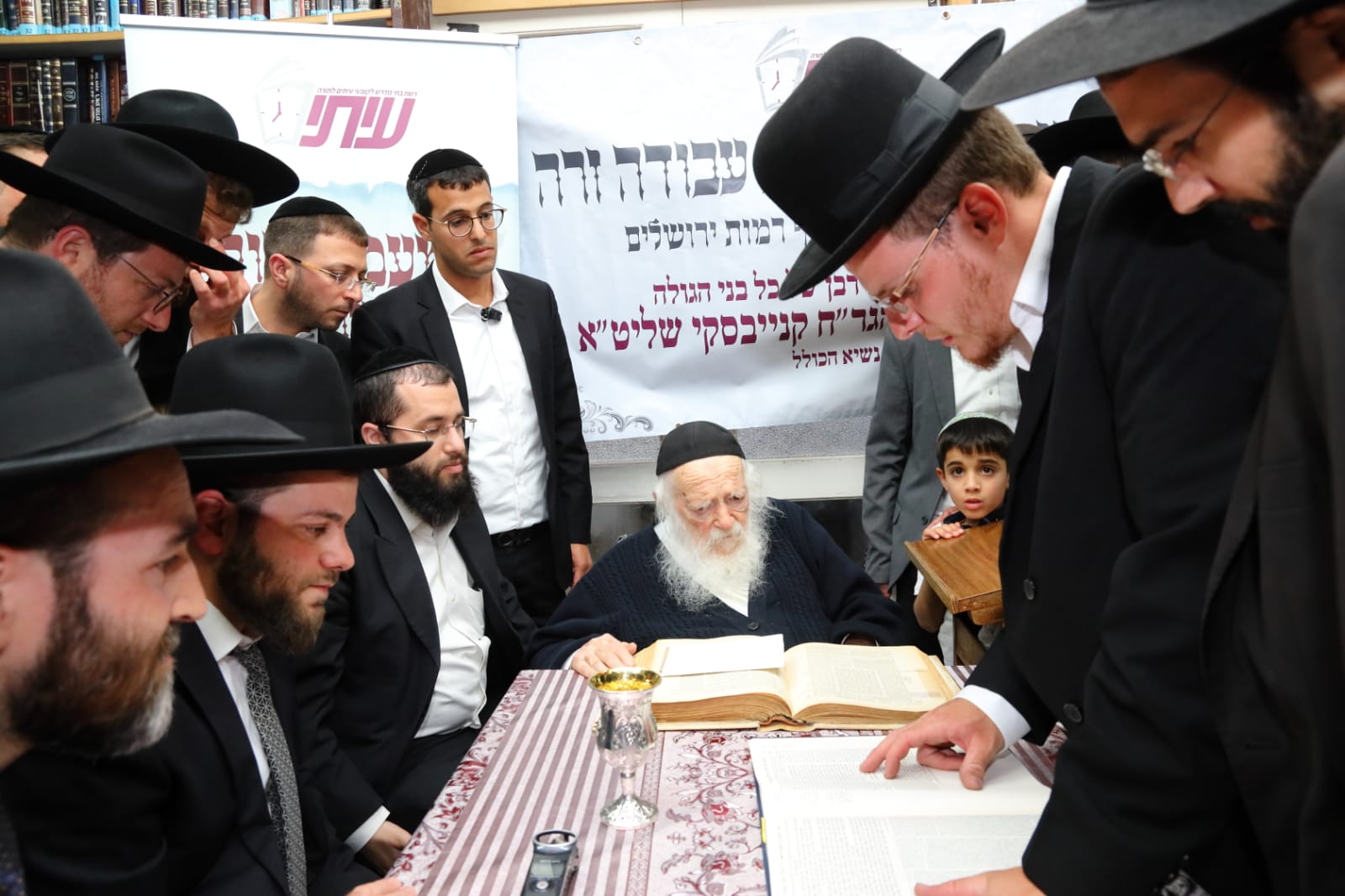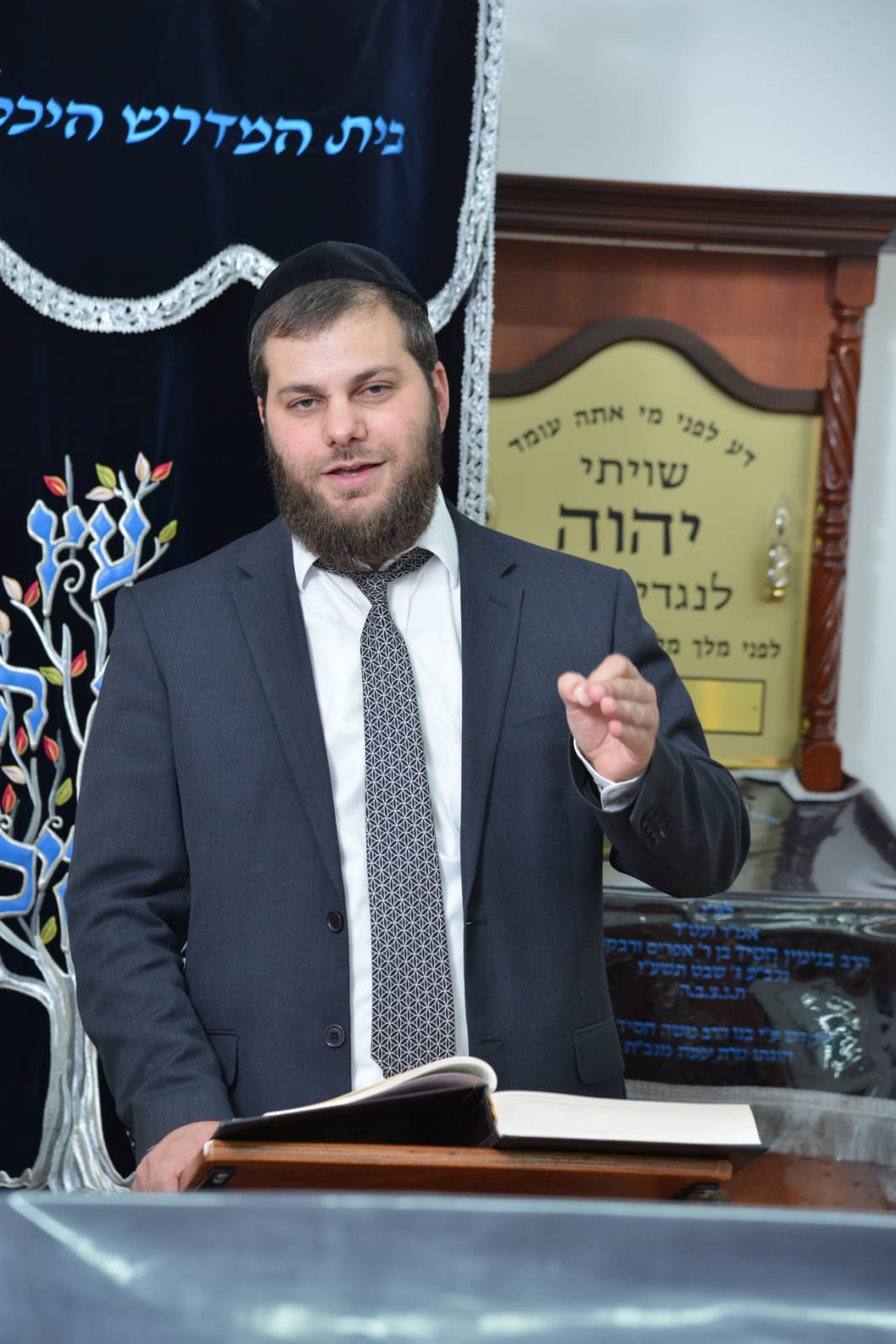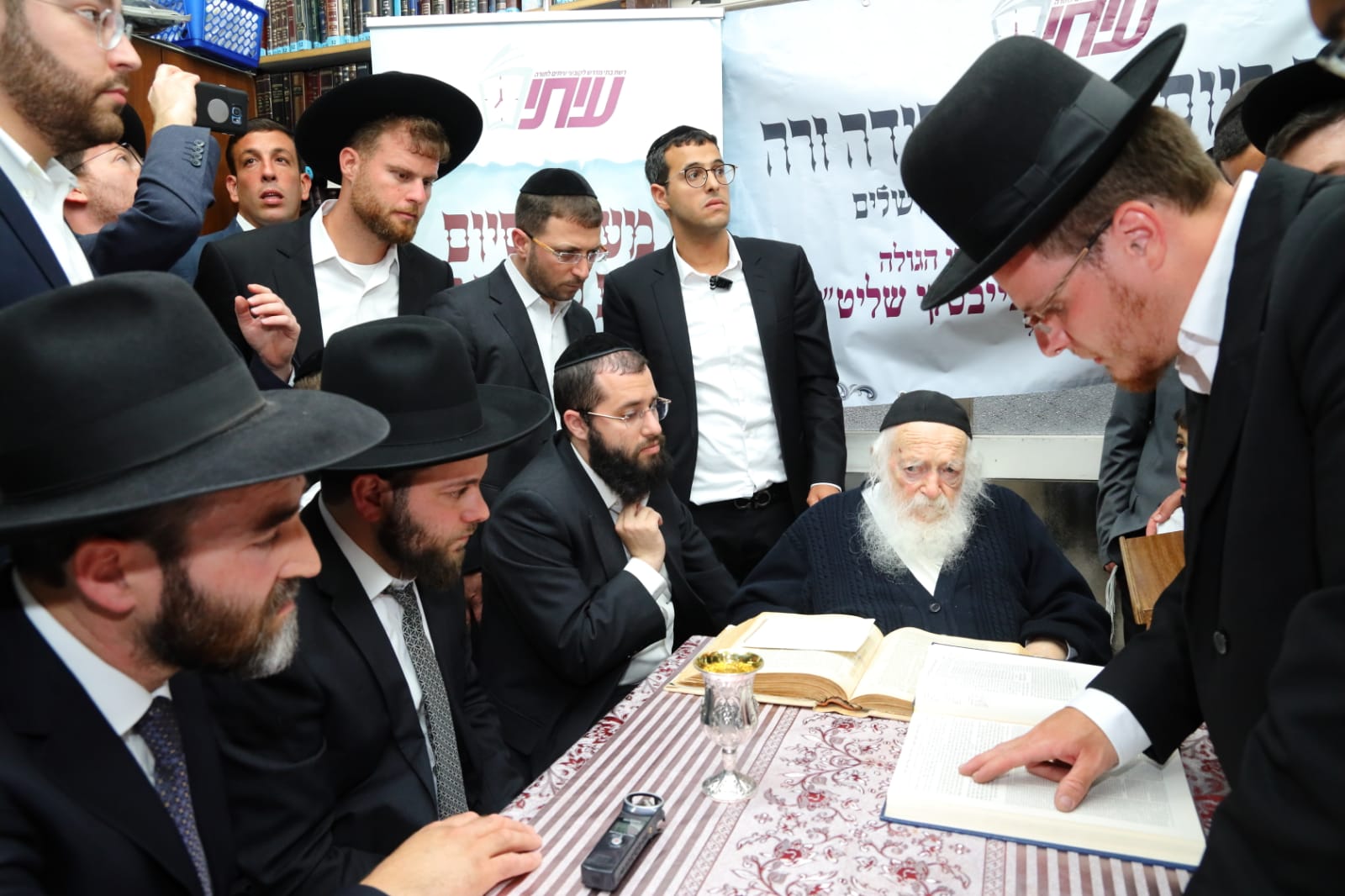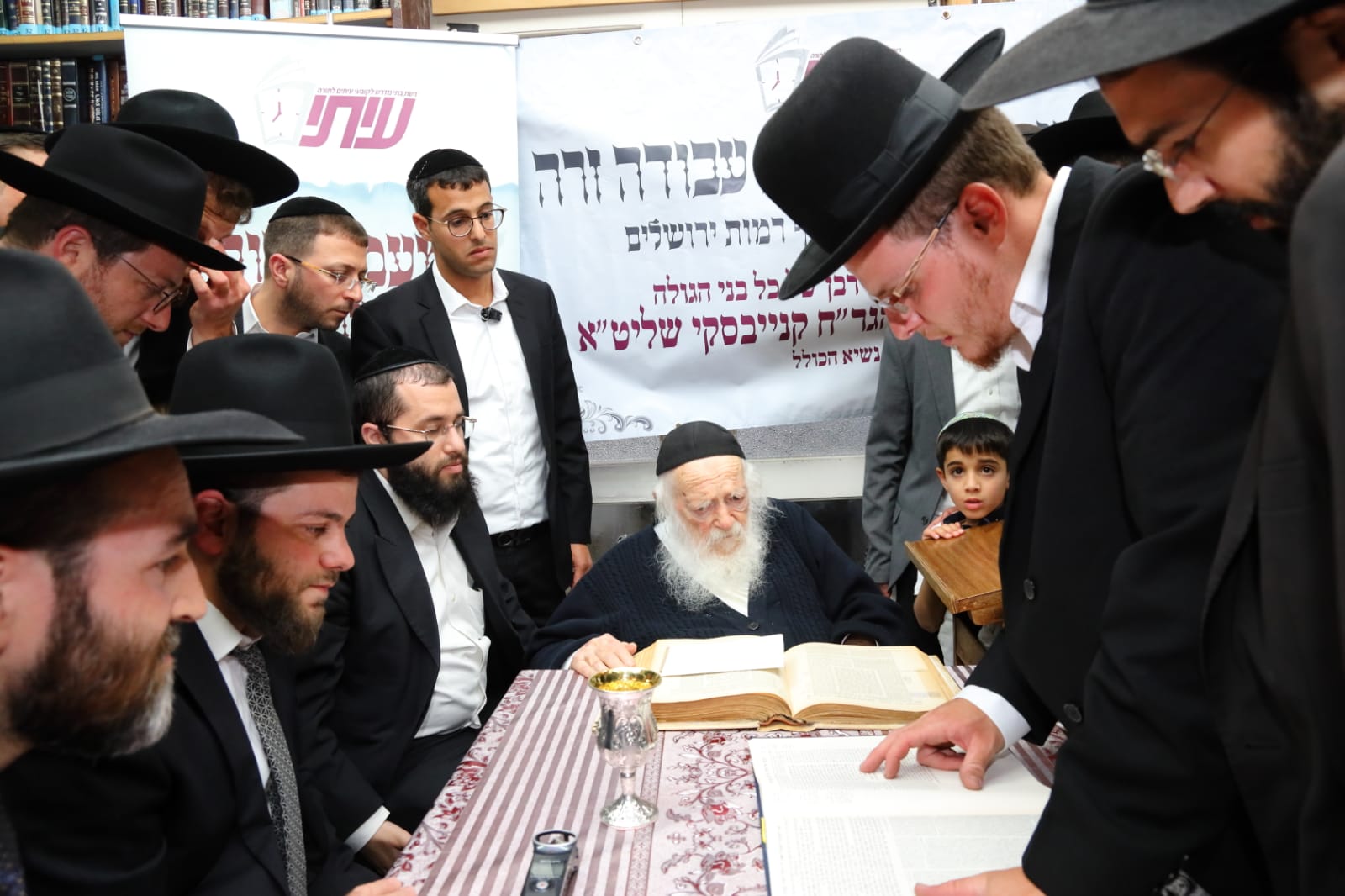“We believe that a Jew can remain entrenched in the Torah world even while working in hi-tech or a law firm.”
Harav Yitzchak Elkayem is building a community of Israeli baalabatim who aspire to continue learning, remaining profoundly connected to the Torah world, and entrenched in the mainstream charedi sector. * He warns of the spiritual perils of neglecting this growing sector and emphasizes that the charedi community in Eretz Yisrael must accept all its members, including those who leave the hallowed halls of yeshivah to enter the workforce. Acting on this conviction, he founded a baalabatim kollel that offers learners a respectable monthly stipend, keeping them connected to the Torah community. * The vision: Building a community of professionals who are talmidei chachamim and kovei’a ittim la’Torah.
Harav Yitzchak Elkayem is not the run-of-the-mill rabbi or rosh kollel. At the age of 34, he set out on an intrepid journey that many prophesied would end in failure. Yet, defying the many odds and objections, only two years later, Rabbi Elkayem can proudly declare that the first stage of his odyssey is crowned with success. With motivation, conviction and overpowering love of Klal Yisrael, he has sowed seeds of deep change into the charedi conscious in Eretz Yisrael and is revolutionizing the sector’s approach to young men who choose to enter the workforce.
The charedi sector in Eretz Yisrael places limud Torah on a pedestal, for the most part mandating that young males remain within the rigorous yeshivah framework throughout their lives. Particularly in the Litvish community, leaving yeshivah or kollel to join the workforce is frowned upon, albeit in the past decade, the trend of young working charedi men has been steadily increasing as more and more feel compelled to pursue a career.
In the past, young men who abandoned the beis medrash to enter the working world confronted massive spiritual and social obstacles. Foremost was the startling, eye-opening switch from full-time learning in an insular, spiritually-conducive environment to a secular world replete with endless possibilities and pitfalls. Moreover, since joining the workforce was discouraged for numerous reasons, the bold young men who stepped out of the box to choose this unconventional path were often rejected by their peers and social circles and forced to seek an alternate environment where they could feel comfortable. Another prominent issue was the dire lack of study frameworks, shiurim and kollelim designated for baalabatim, places where these young men who still felt intrinsically bound to learning and the yeshivah world could find their niche. Cut off from their spiritual lifelines and lacking a suitable replacement where they could be kovei’ah ittim la’Torah at their own pace, many young men, singles and married, unfortunately found themselves drifting far from mainstream charedi life and society.
Over the past decade, there has been a gradual shift. Spurred by financial need, many charedi men do go out to work within several years of marriage, and there has been a virtual explosion of educational and career opportunities for charedi men seeking to build a professional life while remaining rooted in the Torah world.
Harav Yitzchak Elkayem is one of the pioneers seeking to build a cohesive society of Torah-true professionals in Eretz Yisrael. To advance his goal, he founded Ittim, a network of baalabatim kollels geared to yeshivah alumni in the workforce that provides them with a warm, supportive Torah community whose foundations are limud Torah and ahavas Yisrael. Ittim is there to absorb the thousands of bnei Torah in Eretz Yisrael who, branded by social stigma, are liable to find themselves slowly and consciously or subconsciously distancing themselves from the society that is their natural home and spiritual bastion.
“Growing up, we were taught that a person who doesn’t learn is spiritually vacant, worthless.” In this special interview with Yeshiva World, Harav Yitzchak Elkayem explains his motive in establishing Ittim . “The Torah is the central axis of Litivish and Sephardic bnei Torah communities in Eretz Yisrael. Since Torah is the most precious and valuable asset in the world, the prevailing outlook was that one who learns and is connected to Torah is deserving of social stature and prestige, whereas one who went out to work and loosened his connection to Torah is undeserving. This narrow perspective caused young working men to find themselves at a massive disadvantage as their social status plummeted drastically.”
According to Rav Elkayem, placing limud Torah and talmidei chachamim on a pedestal certainly has its spiritual benefits as it motivates many to strive for greatness in learning; yet on the flip side, has also created a destructive societal trend.
“It’s a vicious cycle,” he expresses in an anguished tone. “In Eretz Yisrael, one who leaves the beis medrash is made to understand that he has no place in the Torah world; his social status drops, he’s not respected in his shul or community, his kids don’t get into the top schools, etc. He is negatively branded by society, forging an impassable social ravine, and these repeated rejections only propel him farther and farther away from what is truly holy. For most, the natural reaction is either to reject it all or else to believe it—which in this case means believing that he is less holy or important than his next door neighbor who learns in kollel, and this ultimately becomes a self-fulfilling prophecy.”
Rav Elkayem’s initial attempt to introduce social change was to rally a group of yeshivah alumni who had set out to work but were genuinely committed to a strict daily learning regimen and remaining one with charedi society. The first group of men coalesced in a shul in Ramot and has since gathered nightly from 8:15 – 10 p.m. for an intensive learning program. To date, the first Ittim group has already completed three masechtos!
While kollelim for baalabatim exist in many cities around the world, it is still quite a revolutionary concept in Eretz Yisrael. “We created a special model,” says Harav Elkayem. “On one hand, we wanted something that was more than a basic shiur. Ittim avreichim are talmidim of some of the top yeshivos in the country. A standard shiur delivered by a maggid shiur doesn’t bind them authentically to the Torah world, since they’ve already experienced real learning and know that it can only occur with a chavrusah. They know that learning with a chavrusah produces better, deeper results; it’s more meaningful, accomplishing, and demands more of the person. And that’s the story of Ittim. We’re not a network of shiurei Torah; we’re a community of lomdei Torah.”
In order to foster commitment to the program, Rav Elkayem rewards the men who devote time every evening to learn gemara with a chavrusah with a monthly stipend, just like a regular kollel. This is in contrast to many existing baalabatim kollels that do not offer any financial incentive to the learners-workers.
“Payment engenders commitment,” he asserts by way of explanation, “and working men understand this best of all. They know that time is money, that time is an invaluable resource. Unlike their counterparts who are learning full-time in kollel, the money doesn’t necessarily go to cover their basic bread and milk, but it does foster a commitment to the kollel. Most participants in Ittim aren’t wealthy either. The average age ranges between 25-35 years old, and they are in the early stages of building their families and careers. For most, the stipend is a help, especially since they could have easily chosen to work an extra hour or two at night and earn significantly more money, but instead choose to come learn in the beis medrash. To me, that’s a very big thing.”
Avreichim receive a stipend from Ittim for a limited period of time only. “It’s a tool that helps them enter and integrate into the track and get committed. By a year or two, it’s usually completely superfluous, because the force connecting them to the learning is the Torah itself. Then, we can redirect the stipend to new members.”
Rav Elkayem is greatly encouraged by his success, and he has no intention of stopping or even slowing down. The current agenda is to open several new Ittim branches this coming Elul, while the broader vision is that, one day, to see vibrant Ittim community flourishing in every neighborhood in Eretz Yisrael, communities of baalabatim who prides itself on their commitment and love of Torah. He is not oblivious to the challenges of reframing a sectoral-wide approach and overcoming decades-old stigmas, yet refuses to despair.
“Our central task right now is to build ourselves spiritually from the inside, rather than focusing on external images. We know that we’re doing the very best thing we can do, and I’m sure that, as a result of this confidence, the image that we project to the world will change faster than we think. As soon as people see that we have a large group of professionals—lawyers, accountants, engineers, architects, businessmen et al, who are all yirei Shamayim and walk around with a gemara under their arm, they’ll respect us as genuine bnei Torah.”



















2 Responses
A great article that speaks to the tens of thousands of frum young men, including a growing number from the Chareidi tzibur who have pursued a professional career while maintaining their commitment to limud torah and yiddeshkeit. Kol hakovod to Rav Elkayim for providing support and encouragement so that more Chareidi youth can expand their horizons and provide needed professional services to their own communities and klal Yisroel
@Gadolhadorah ” tens of thousands of frum young men” in Hi-Tech??? are you joking??
and how do i join this kollel? is it for bachrim as well??